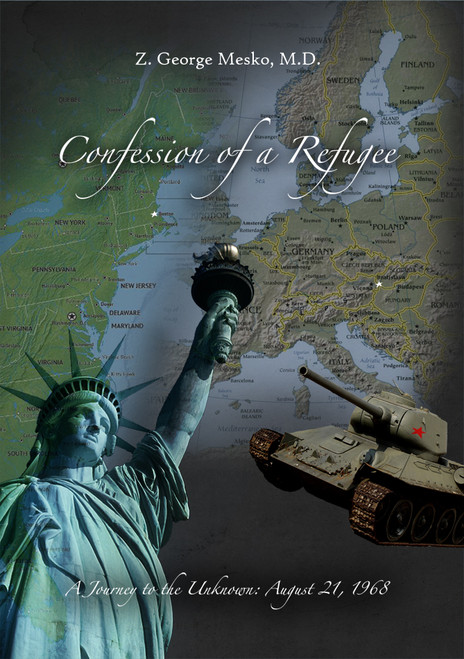Product Overview
Confession of a Refugee - A Journey to the Unknown: August 21st 1968
By: Z. George Mesko, M.D.
About the Book
The “leitmotiv” of this “confession” is the misfortune of a young physician, who with his family (children of 2 and 5 years old) finds himself in the wrong place at the wrong time. On August 21st, 1968, the day of the invasion of the Red Army of USSR into Czechoslovakia - under cover of the night, he was in Yugoslavia on his way home from his vacation on the Adriatic. He, as a refugee, had to overcome incredible odds to get to the USA, the country of his hope and freedom.
About the Author
Z. George Mesko, M.D., Emeritus, Associate Professor of Medicine (Pediatric Cardiology) SUNY.
Fellow of American Academy of Pediatrics, Fellow of American Academy of Cardiology.
Fellow of Royal Society of Medicine, London.
Graduated from Medical School of J. A. Commenius in 1952 in Bratislava, Czechoslovakia.
Z. G. Mesko, M.D. specialized in Pediatric Cardiology at the Children's Hospital in Kosice and Bratislava. In 1956, he was the Physician in Chief at the Heart Institute for Children in Sliac, Czechoslovakia. Fortuitously in 1960, he met a visiting Pediatrician from Boston, USA, who was surprised by the high level of professionalism of this Institution in a country behind the Iron Curtain. Through her efforts, he received an invitation for a Fellowship at the Children's Hospital in Boston at Harvard Medical School. This eventually, in 1968, saved his life when it provided him with a helping hand to enter the USA in 1969.Besides his specialization, he participated in significant charity work at the Gift of Life Foundation at St. Francis Hospital Heart Center in Roslyn N.Y. In 1987, at the initiative of Mrs. Nancy Reagan, his team went to South Korea and examined 500 children with heart disease out of which about 300 came to St. Francis Hospital Heart Center for corrective surgery, where he was the leading diagnostician before surgery. In 1990, he initiated the establishment of a Children's Heart Center in his native land, in Bratislava, Slovak Republic, supported by the Heart to Heart Foundation of the American-Slovak diaspora with a grant from the Agency of International Development administered by Project Hope.
In 1996, he retired and turned to writing, and published two books of political history on Communism and two books of personal oral history and his memoirs.
(2020, eBook)
“This story reminds me of Homer’s epic, The Odyssey, as Odysseus faced the treacherous waters of the Aegean Sea to reach the island of freedom, Ithaca. Likewise, the author had to tread the devious waters of the “Red Sea of Communism”, until he reached the island of freedom, the United States of America.”
Alan Guerci, M.D.
Professor of Medicine, Johns Hopkins University
Baltimore, MD
“The authors segmental autobiography is one of the best emigrant experience accounts that I have ever read. He puts into perspective not only the emotional meaning of leaving his native land, but also the challenges for one who has taken such a step. His description of his life in America is delightful. His book not only reads well, but you almost can feel his presence as you read it, as if he were telling you his story directly. The author’s life story of a resilient spirit who never forgot his origins, rather found in them a source of strength while experiencing a new life. His brilliant career as a physician testifies to his strength of character, his perseverance, and his courage.”
Prof. Stan Kirschbaum
Professor of International Studies
Glendon College, York University, Toronto, Canada
“The author and his family lost their home when the Red Army of the U.S.S.R invaded Czechoslovakia, his homeland, in 1968. Their extraordinary journey then began in Belgrade with the help of his “Blue Fairy” and her friends who always stood by him when he found himself between a rock and a hard place. He reached Children’s Hospital at Harvard University in Boston in June, 1969, and was trained there as a Pediatric Cardiologist. In 1978, his career brought him to St. Francis Hospital Heart Center in Roslyn, New York, which was associated with New York University. There he worked until his retirement in 1996. During this tenure he greatly assisted in the establishment of the new Children’s Heart Center in his native Bratislava.The memoir of this determined immigrant physician and his devoted, resilient wife and family is truly moving.”
Dr. John F. Keane M.D.
Professor of Pediatric Cardiology at Harvard School of Medicine, Boston, MA.
“The author details the fascinating trip of an accomplished cardiologist after the surprise invasion of the Red Army of USSR into his native land. He describes the passion and uncertainty and hard work required to move with his family to a better life. Some fortuitous events and the actions of his friends helped to eventually secure a successful life and career in the United States. This book should help the reader to better appreciate the advantages of life in a free society.”
Dr. Bert S. Litwin M.D.
Professor and Director of CardioThoracic Surgery,
Children’s Hospital,
Milwaukee, WI







